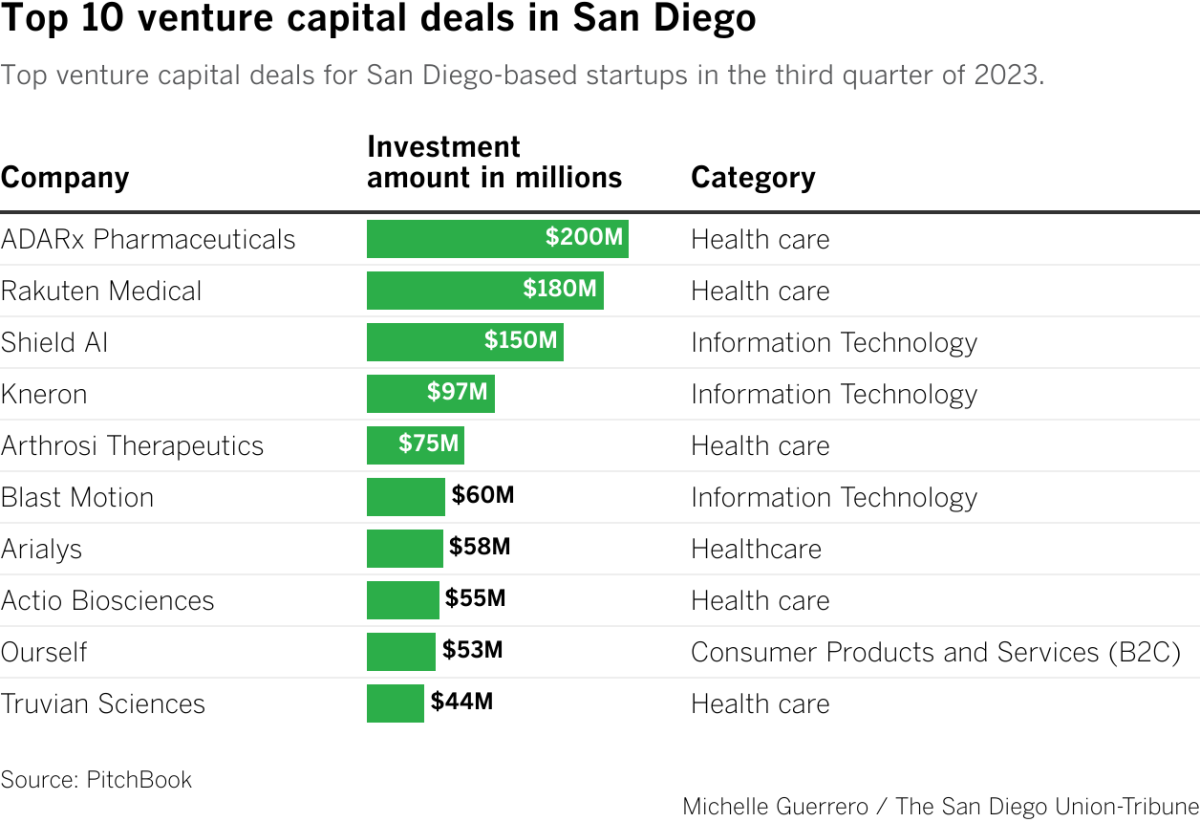Startups in San Diego County raised about $1.14 billion during the third quarter ending Sept. 30, according to data from the Venture Monitor report from research firm PitchBook and the National Venture Capital Association. That’s nearly a 10 percent increase from the same period last year.
The region saw a total of 50 deals during the third quarter — a five-year low in terms of deal activity. In the same quarter of last year, there were 78 deals.
Although San Diego had fewer deals this quarter, the fundraising rounds and exits it recorded were big. The region’s top three venture capital deals of the quarter were each worth at least $150 million.
In July, biotech startup DTx Pharma was acquired by drug giant Novartis in a deal worth up to $1 billion. In mid-September, RayzeBio, a radiopharmaceutical company targeting solid tumors, raised an over-sized initial public offering (IPO) of $311 million.
So far this year, San Diego County has raised a total of $3.09 billion, meaning venture capital fundraising is down about 12 percent compared to this time last year. During the first three quarters of 2022, San Diego raised $3.52 billion.
Across the country, startups netted a total of $42.7 billion during the first three quarters of 2023. With the year nearing its end, the amount of fundraising is a far-cry from the total $172.5 billion raised last year. The report cites high interest rates — which make it more expensive to borrow money — and fewer opportunities for startups to make big exits into the public market, as some factors weighing down fundraising activity.
Overall, U.S. venture capital fundraising is on track to record a nine-year low, according to the report.
The general venture capital ecosystem remains sluggish and continues to be a difficult environment for companies to raise capital.
“It’s a tough time to be a life science company raising money, but San Diego has done a good job in the last five years of becoming also a tech community,” said Mike Krenn, who leads Connect/San Diego Venture Group.
San Diego is already well known for its life science cluster, so Krenn’s organization has worked to bring more attention from venture capitalists to its tech scene. Today, the region has a healthy mix of growing early and late-stage companies developing communications, software and defense technology.
In contrast, Krenn pointed to the hit tech-centric regions like Austin, Texas, took during the third quarter. Venture capital funding in Austin was down about 33 percent year-over-year, whereas San Diego is about even with last year.
During the third quarter, four out of San Diego’s top 10 venture capital deals were non-health care startups — three technology firms and one consumer product company.
Among the top three deals was Shield AI, a defense technology startup developing self-driving drones using artificial intelligence.
Shield AI was founded in 2015 by two brothers, Ryan Tseng an experienced tech-entrepreneur and Brandon Tseng, who served seven years in the U.S. Navy. The third co-founder is Andrew Reiter, who worked on one of Draper Lab’s robotic guidance systems.
They developed software that provides planning, mapping and other features that enable military aircraft and its V-BAT drones to conduct maneuvers autonomously.
This week, Shield AI closed an oversubscribed $200 million Series F round, less than a year after it raised $60 million in December. Ryan Tseng, CEO of Shield AI, said fundraising is always strenuous for founders, but it hasn’t been harder or easier compared to last year.
“The attention has been toward the financials more so than it ever has been,” he said, adding that is to be expected for their stage as a company.
Shield AI has raised approximately $773 million to date and is now worth about $2.7 billion.
Ryan Tseng started his first company during the financial turmoil of 2007 so he’s always had a mindset of doing more with less. With that in mind, he said Shield AI hasn’t had to change its business strategy or fundraising objectives as they’ve kept their focus locked on building a strong product, breaking even and reaching profitability within the next couple of years.
“We sort of marched into this environment, on a position where we were already on a path toward breakeven and profitability,” he said. “And that’s sort of the right move for any company, I would say in this economic environment.”
The company employs about 625 people, including 165 people in San Diego, where it’s headquartered. Tseng said Shield AI is hiring for more than 50 roles in San Diego, Dallas and Washington, D.C., including paid-summer interns.
Another notable consideration for San Diego’s startup ecosystem performance is how it stacks up against other regions over time.
In PitchBook’s new global venture capital ecosystem ranking, it scored San Diego’s development in the top 20 locations across the world, based on the size and maturity of its VC environment between the third quarter of 2017 and June 30. A few factors the development ranking looked at include deal activity, capital raised and the number of regional funds, which are the groups who control the money going to startups.
San Diego had by far the fewest venture capital funds located within its region at 38, but it still managed to come ahead of Denver, which has almost three times more local funds. Additionally, San Diego generated more deal value ($27.2 million) than higher ranked major U.S. metros — Austin ($21.9 million) and Seattle ($26.7 million). The region’s exit value ($36.6 million) during that period was also greater than the three U.S. cities ranked above San Diego — Austin ($25.1 million), Seattle ($30.6 million) and Washington D.C. ($24.9 million).
“The VC’s aren’t here … but yet we’re outraising those markets, despite having less resident capital,” Krenn said.
